
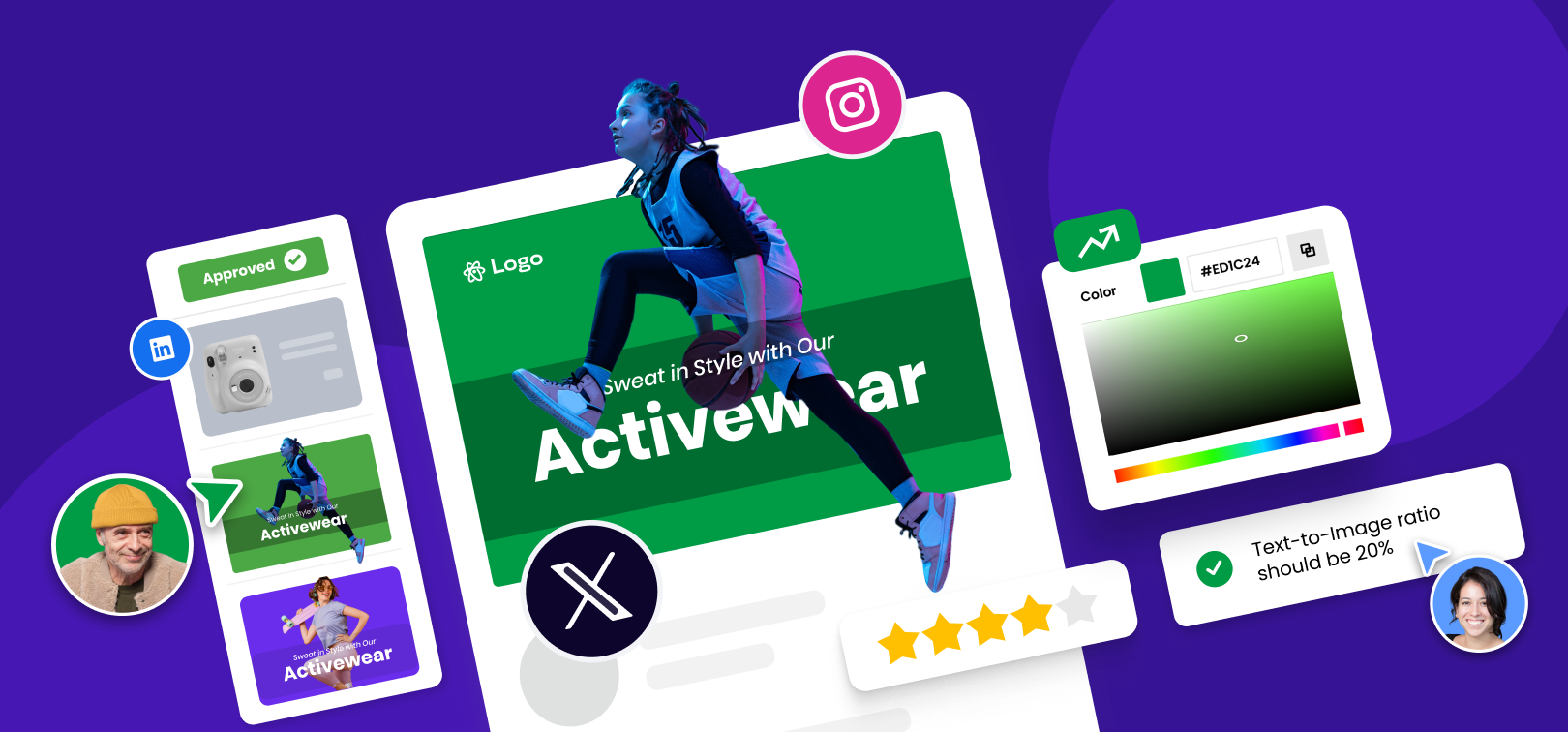
A typo, a missing disclaimer, or a misplaced logo, can put a big question mark on a brand’s credibility, or worse, land them in legal soup! That’s how important brand compliance is. Building and nurturing a brand and its identity is a laborious process that unfolds over the years. Consider, for instance, two of the most coveted luxury designer brands: Gucci and Louis Vuitton. These high-end labels command prices that reflect their exceptional quality, craftsmanship, and unique fashion sensibility. However, it’s their meticulously crafted brand identities that set them apart. Owning products from these brands not only signifies a taste for luxury but also places individuals within an elite circle.
For these companies and many others, creating and maintaining a brand identity is a painstaking endeavor. A single misstep, like a misaligned Gucci “G” or an incorrect Louis Vuitton font, could potentially tarnish the brand’s reputation.
Beyond maintaining the brand’s reputation, brand compliance can have legal and financial ramifications. In a humorous advertisement, PepsiCo promised a Harrier Jet in exchange for collecting points by drinking more Pepsi. A student took the offer seriously and demanded his jet, leading to a lawsuit that prompted them to add a “just kidding” disclaimer.
Brand compliance is part of the larger umbrella which is brand safety. Brand safety isn’t just about safeguarding reputation and avoiding legal troubles; it seeps into the daily operations of an organization. Consider fast-moving consumer goods (FMCG) and other consumer brands present on ecommerce and quick-commerce platforms. These brands rely on advertisements on all possible digital platforms to drive sales. But the process isn’t as straightforward as it seems. The images created by brands for promotional purposes must be uniquely tailored to the guidelines and requirements of each platform.
However, when these creatives are being made at a mammoth scale for every platform simultaneously, it is easy to miss out on a lot of these rules, leading to creatives getting rejected. Take the example of the world’s largest ecommerce platform. They often had to reject nearly 50% of the creatives shared by advertisers for not being compliant with the guidelines of the platform. Brands can’t afford this compromised visibility, especially during sale seasons when consumers are more inclined to make purchases.
Brand safety, as we’ve seen, permeates every facet of a brand, from its overarching identity to its day-to-day operations. It’s a critical element in the complex tapestry of branding, one that deserves unwavering attention and diligence.
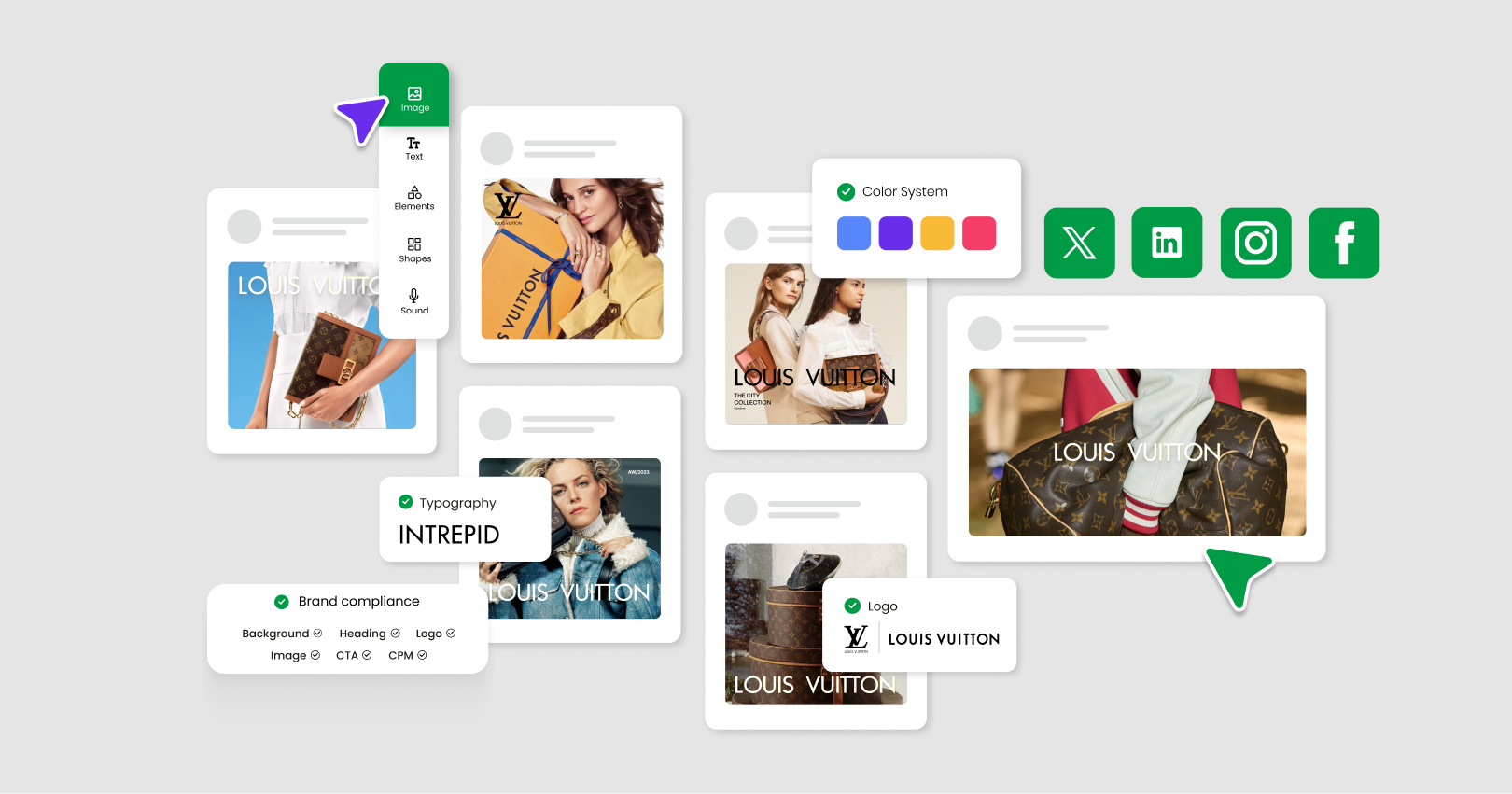
In the seemingly straightforward realm of brand safety, there’s a rich tapestry of dimensions that come into play. It’s a multi-layered concept that we can dissect into three crucial parts. Let’s explore these layers in depth.
In today’s digital age, where everything from cutting-edge gadgets to everyday spices is readily available online, it’s imperative for brands to have a strong presence on ecommerce and quick commerce platforms. To achieve this, brands must share relevant product images and banners that align with the requirements of these platforms. However, a common point of contention arises when these shared images fail to comply with the platform guidelines. The result? Advertisers and online retailers find themselves in a fix, needing to rework noncompliant visuals.
This not only delays campaigns but also leads to revenue losses for both advertisers and the ecommerce platforms. The pressure escalates further during sale seasons when the urgency to launch campaigns intensifies.
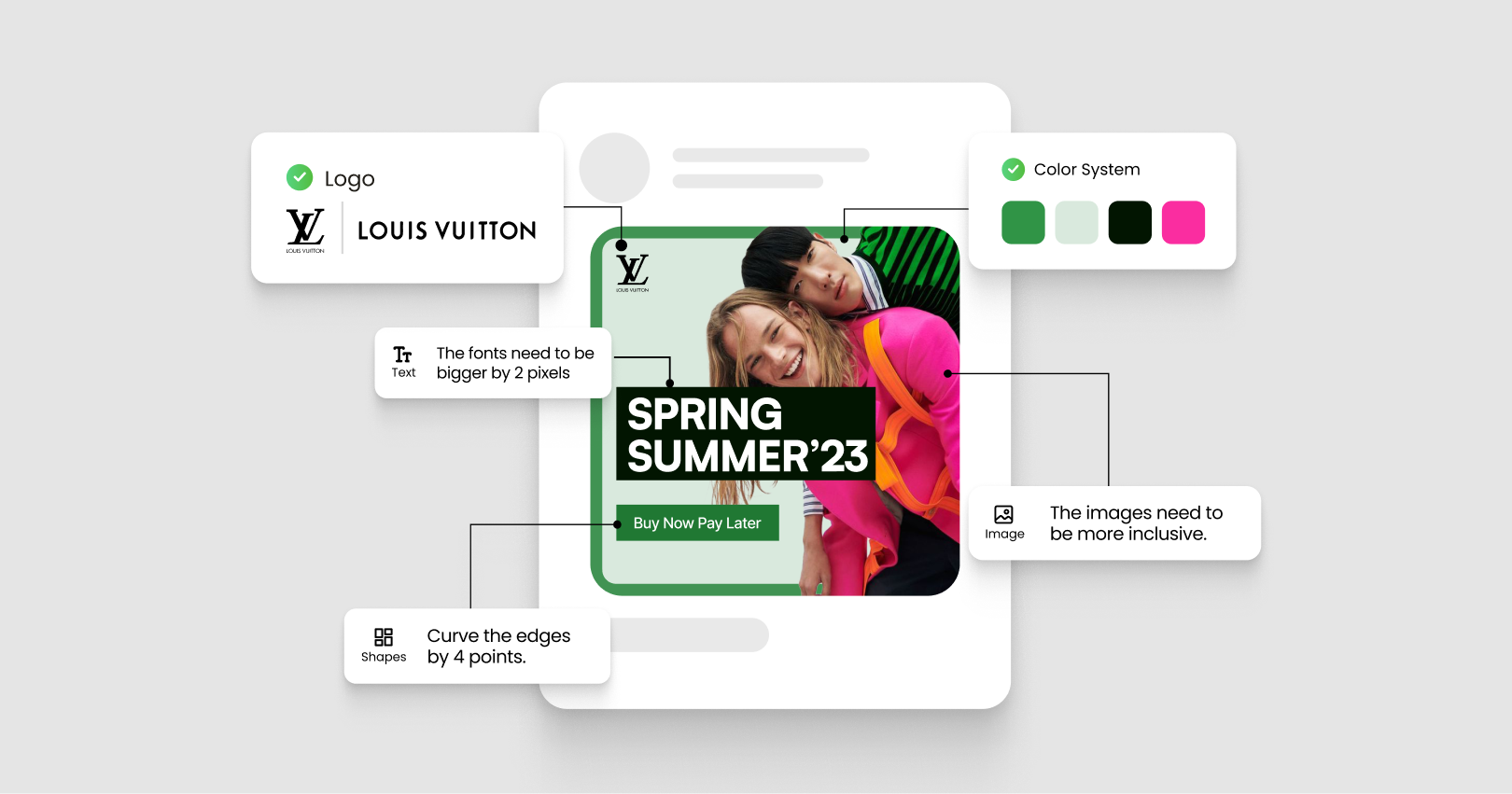
Brand compliance is simply adhering to the rules and guidelines of a brand and industry benchmarks. Building a brand identity takes years of meticulous effort, and this identity is embodied in how the brand presents itself. Think of the iconic golden arches of McDonald’s or the Nike swoosh; these symbols immediately conjure their respective brands. Now, envision those arches turning blue or the swoosh being reversed in certain communications. Such inconsistencies can jolt our perception and cast doubt on the brand’s credibility.
Every piece of communication that a brand sends out for public consumption must align with its brand guidelines, encompassing aspects like color, logo placement, font, tone of messaging, and more. Companies must also be cautious before making any unauthorized claim or putting out sensitive information in their public communication. No brand wishes to face hefty lawsuits for an inaccurately represented map or offer a Harrier Jet due to a missing disclaimer in their advertisements.
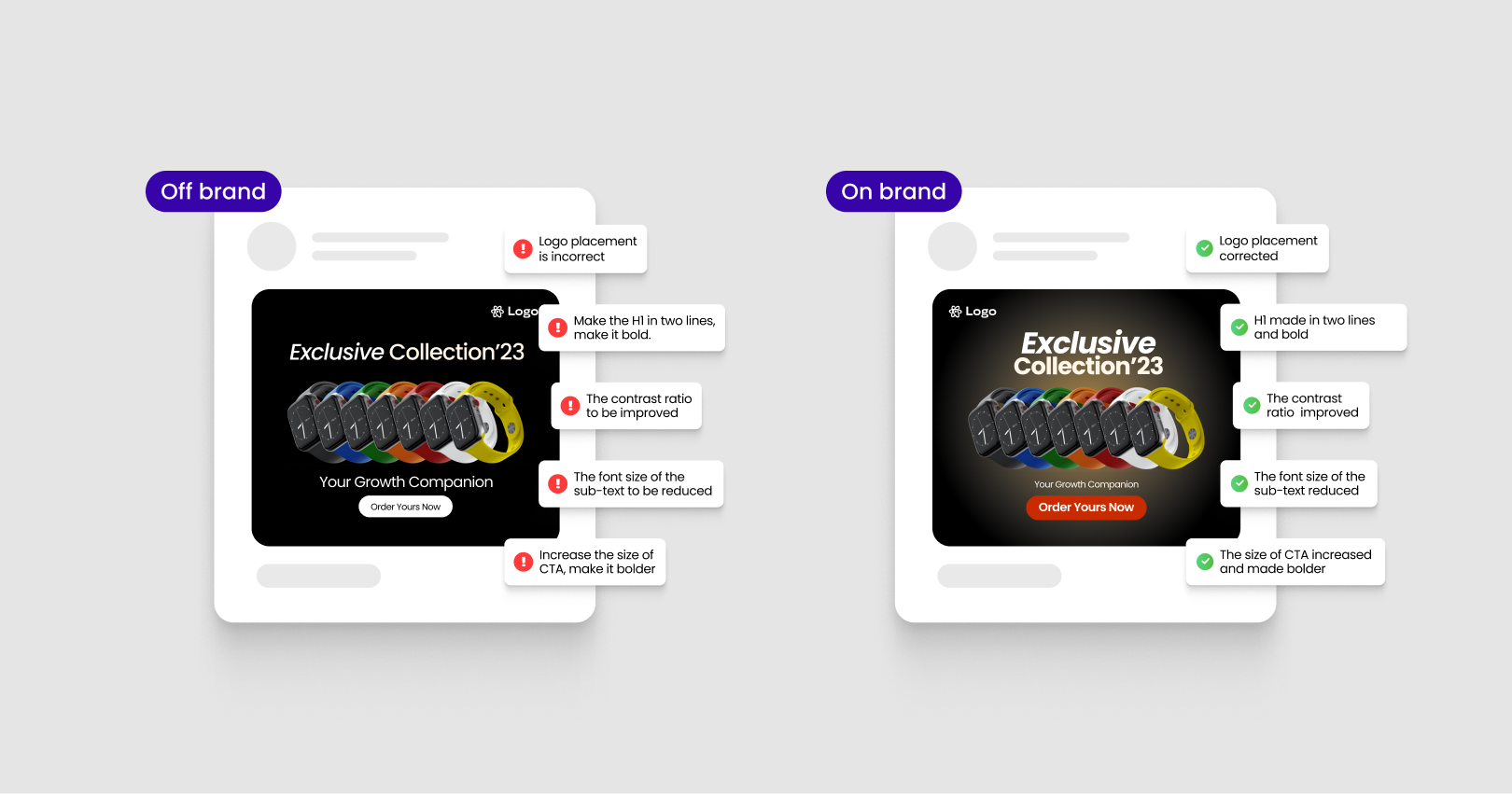
In today’s landscape, brand safety goes beyond platform regulations and brand compliance. Brands aspire to convey the values they hold dear through their communications. For instance, many enterprises today champion diversity, equality, and inclusivity within their organizations and seek to extend these values to their public communications. This involves ensuring fair representation of individuals from diverse backgrounds—across race, gender, ethnicity, and more—in all public communications. Beyond these values, brands may choose to convey other principles in their messaging, and the key lies in maintaining consistency with these values across all communication channels.
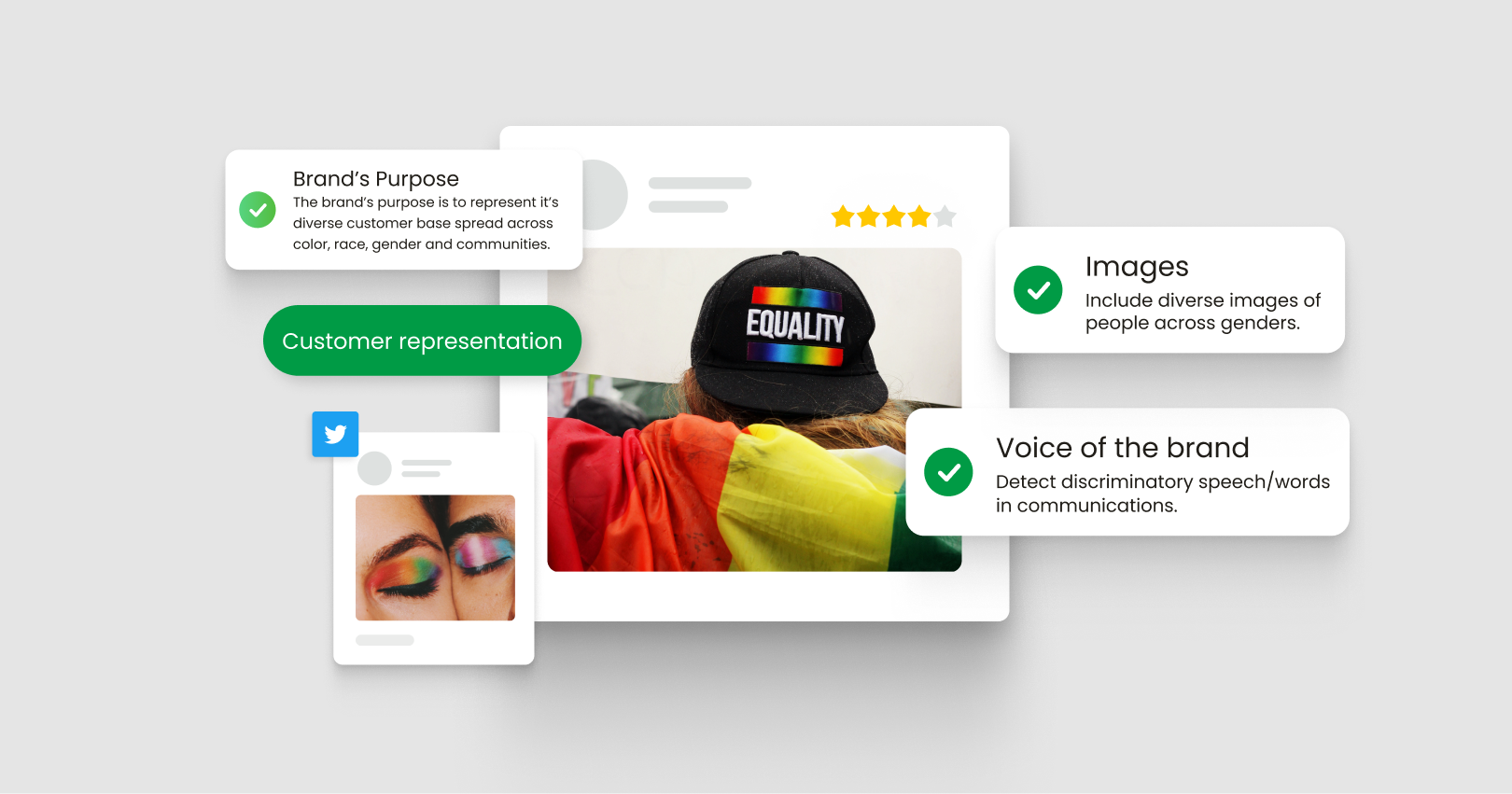
The significance of brand compliance and safety is nothing short of monumental. Yet, the path to ensuring it remains a labyrinth. Let us break it down,
So currently, we stand at a paradoxical juncture where the importance of ensuring brand compliance and safety is paramount, but the process of doing the same is highly inefficient and error-prone, to say the least. Rocketium’s AI-powered brand safety solution sits perfectly at this crossroad by automating brand compliance and safety checks, making it a smooth and seamless journey. So, how does it work?
To begin with, Rocketium employs a brand’s custom-made Language Learning Model (LLM) trained with specific brand rules. With Rocketium, brands enjoy limitless customization and tailoring rules to make this brand safety solution uniquely their own.
Here’s a glimpse of what’s possible:
Platform best practices: Brands can effortlessly set creative dimensions to align with the requirements of various platforms, such as Facebook, Instagram, and more.
Rule customization: From fundamental aspects like logo placement and color schemes to nuanced considerations like Diversity, Equity, and Inclusion (DEI) guidelines, brands have the power to define their unique rules and guidelines.
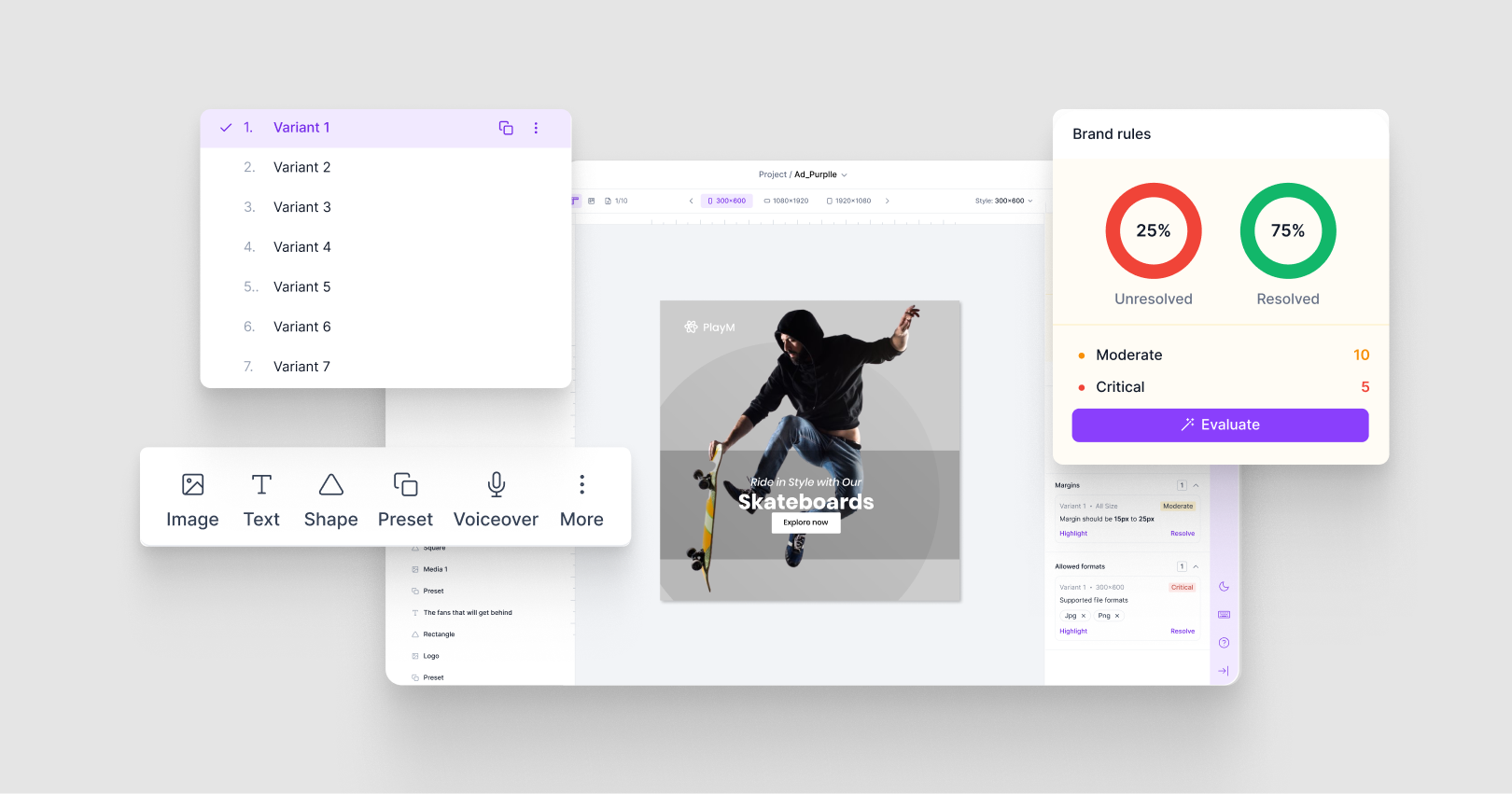
Integration with creative production: Within Rocketium, designers gain access to a brand toolkit
seamlessly integrated into their creative production process. This toolkit includes brand-approved assets, color palettes, and fonts. Rocketium even goes beyond the post-production safety checks by making it a part of the designer’s digital canvas, offering on-canvas design recommendations and real-time alerts whenever a design deviates from the brand guidelines. For instance, if a design predominantly features male models, the system may prompt the designer to consider gender diversity.
Advanced image recognition: For a more traditional approach, creatives are uploaded to Rocketium, and advanced image recognition and computer vision technology come into play. The system deconstructs the creatives into layers and aligns them with the established brand rules. The LLM model meticulously scans the visuals, instantly flagging any deviations from these rules and promptly alerting the concerned teams. This functionality isn’t limited to content created within Rocketium. Creatives made outside Rocketium, can also be uploaded on the platform and it will deconstruct its layers and flag off-brand elements in a similar fashion.
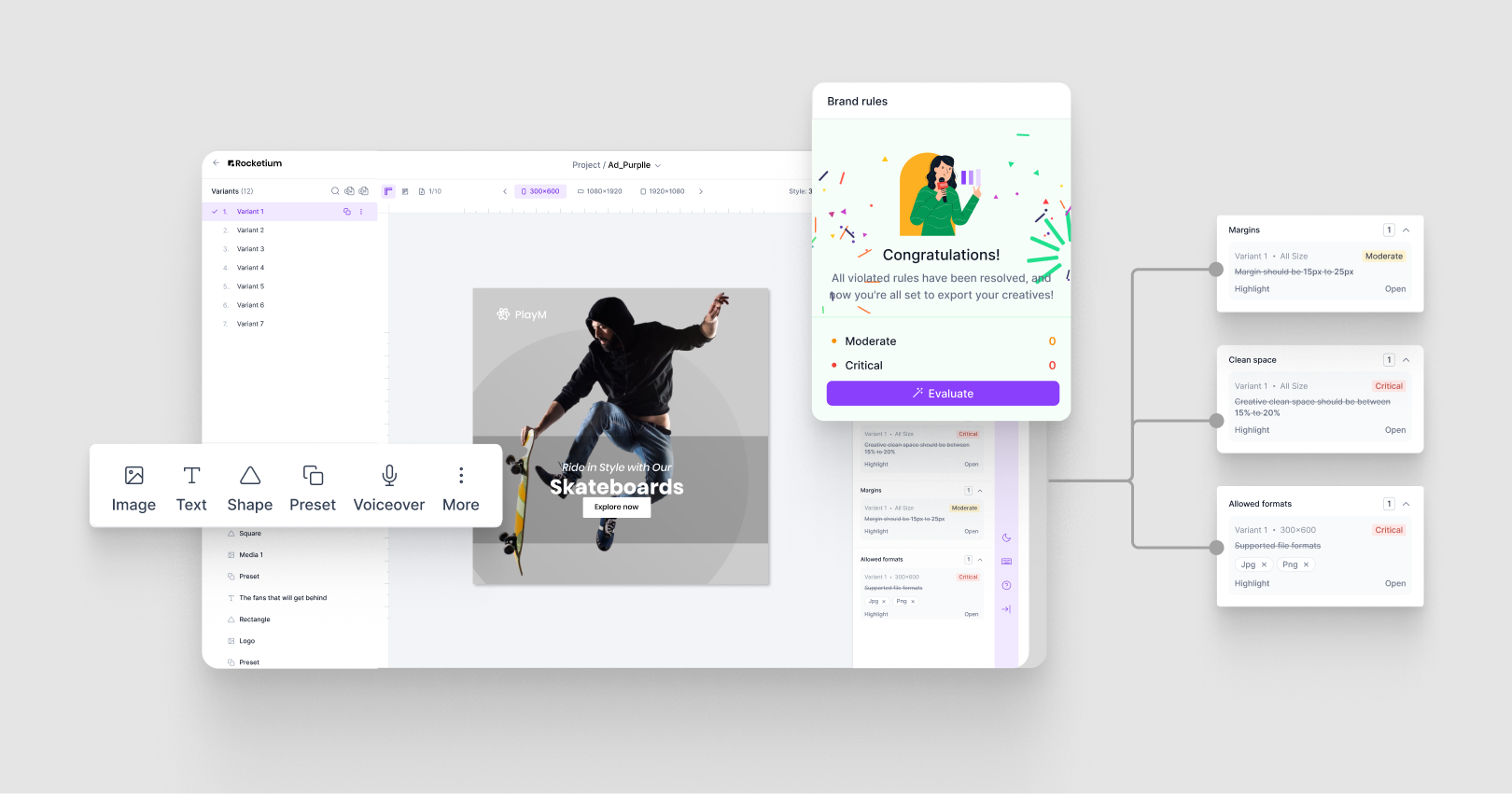
Challenge
This global IT powerhouse creates visual content at a mammoth scale. Being an industry giant mandates them to not only guarantee brand compliance but also strictly adhere to guidelines to mitigate legal risks. Committed to inclusive messaging, the IT leader prioritizes equitable representation across race, color, and gender in its visual communications. In response, the IT giant’s compliance teams undertook the demanding task of manually reviewing creatives from dispersed global teams. However, this meticulous process, involving thousands of creatives, proved time-consuming, error-prone, and burdensome. A transformative solution became imperative.
Solution
With Rocketium’s AI-powered brand compliance and safety, the IT giant automated this laborious process. The company customized this AI-led brand safety solution by integrating its brand rules and guidelines. Once these guidelines were fed to the model, Rocketium’s safety engine automatically checked creatives against custom-configured brand rules and flagged elements that violated those, including DEI principles. With these efficient safety checks in place, the IT giant was able to demonstrate its vision of being an empathetic and inclusive brand.
Impact
100% Brand safety along with upholding brand purpose. As each brand mistake held potential implications of up to $2M+ in liabilities, eliminating these mistakes meant millions of dollars saved for the IT giant.
Challenge
This ecommerce titan, the world’s largest online marketplace, boasts a thriving advertising business. Brands clamor to secure advertising space on the platform to connect with its vast customer base. However, a recurring challenge plagued this platform: the banners and videos submitted by advertisers often fell short of the platform’s stringent standards. To address this brand compliance struggle, internal teams would scour thousands of creatives manually, resulting in a majority of submissions being sent back for revisions. This caused campaign delays for the ecommerce giant, ultimately leading to loss of revenue.
Solution
With Rocketium’s agile CreativeOps, this ecommerce giant now offers a base template with built-in platform rules for advertisers to work from. This revolutionary approach empowers advertisers to swiftly craft stunning product creatives while ensuring brand safety. Moreover, the introduction of custom approval workflows has streamlined safety checks, enabling the platform’s teams to breeze through the process and achieve up to 10 times faster campaign launches.
Impact
Challenge
This major telecom giant ran a multitude of campaigns throughout the year to promote its various lines of business. Ideally, the campaign visuals, crafted by designers, needed a green light from brand teams before going public. However, the existing manual processes proved time-consuming and inefficient. With tight deadlines looming, the growth teams within the telecom company often bypassed brand team scrutiny, resulting in off-brand creatives going live and compromising brand consistency on multiple occasions.
Solution
Rocketium’s design system instigated a cultural shift, integrating brand safety into the very CreativeOps process of the company. Designers gained access to pre-set templates, preloaded with the brand’s standard rules covering fonts, colors, dimensions, and more. Instead of starting from scratch, designers could build upon these templates. If they strayed from brand guidelines, the system flagged it right on the design canvas. This allowed designers to carry out initial checks, after which they could seamlessly tag the brand team members directly on the design canvas for final approval. This centralized approach significantly reduced feedback turnaround time and minimized the risk of off-brand creatives going live.
Impact
If you’re ready to get started on your new CreativeOps journey of efficiency and business growth, reach out to us marketing@rocketium.com.